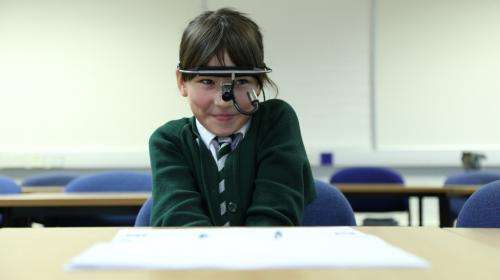Classroom behaviour and dyslexia research

Bournemouth University lecturer Dr Julie Kirkby is investigating the significance of copying and note-taking in the classroom and how it affects the learning of Dyslexic children.
The British Dyslexia Association states that copying presents serious difficulties to almost all learners with dyslexia.
Three children in every classroom are dyslexic; representing approximately 1.2 million children in the UK.
Dr Kirkby's research with The Language and Literacy Group at Bournemouth University investigates how dyslexia affects learners when they are reading from classroom whiteboards.
"Classroom learning is the bedrock of school education, which relies heavily on copying and note-taking. Copying from a board presents serious difficulties to learners with dyslexia," said Dr Kirkby.
The BU lecturer suggested that copying is psychologically complex. The process involves a series of sequential visual and cognitive processes, including visual-encoding, construction and maintenance of a mental representation in working memory, and production in written form.
On a daily basis children transcribe information from text books or whiteboards to notes as Dr Kirkby suggests copying to be ever-present in the classroom.
The cognitive processes involved in copying are under-researched and there is a significant lack of data on how the process takes place relating specifically to dyslexic children.
Improved theoretical understanding of the transcription process will underpin practical educational support of those who struggle with language.
For children and adults with dyslexia, copying off of whiteboards can be very challenging at times.
"In our experiment we use a head-mounted eye-tracker to simultaneous record eye movements, gaze transfer, and written production as adults and children hand-copied specially selected written stimuli presented on the classroom whiteboard."
The results of the study show that adults typically encode and transcribe words as a whole word, but researchers found that even children without reading difficulties used only partial-word representations and separated the to-be-copied words into several sublexical units.
Dr Kirkby suggested that this is a surprising finding.
The impact of the research that Dr Kirkby and her group have undertaken is significant, she said: "We have presented these findings at two international conferences, as well as using the data to form part of an invited talk at Fairley House School, a specialist day school for children with specific learning difficulties such as dyslexia and dyspraxia."
This talk marks the start of research collaborations between Dr Kirkby and Fairley House School.
Furthermore, the findings are published in the Journal of Cognitive Psychology, a special addition on children's eye movement research during reading.
Dr Kirkby's research will be highly significant for future surrounding children with Dyslexia.
She said:"It is our hope that the present and future research will contribute to improved understanding of how encoding, representation and production processes are co-ordinated during copying.
"We hope the study will provide a deeper insight into the language development in children with dyslexia."
















